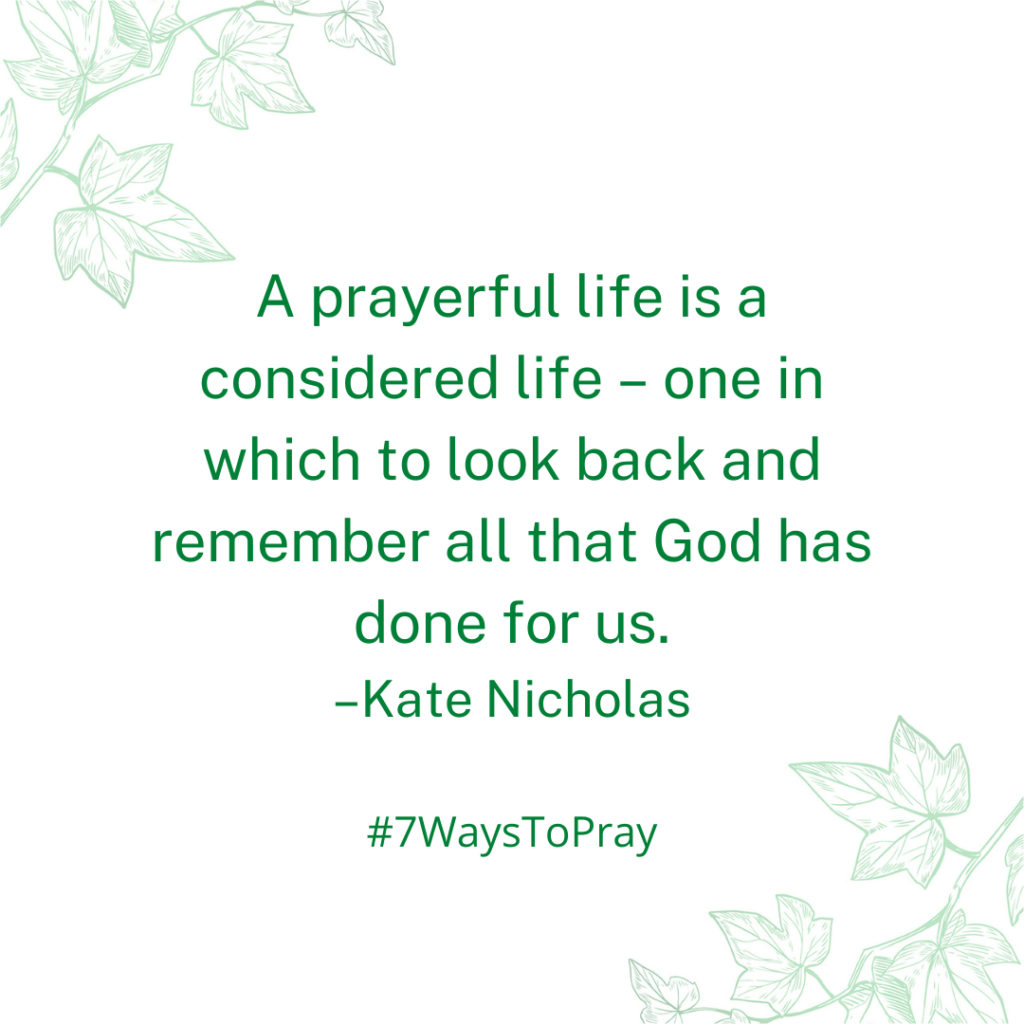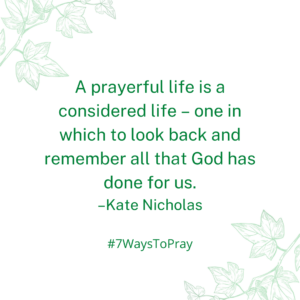“Prayerful Remembrance” by Kate Nicholas: 7 Ways to Pray blog series

I appreciate Kate’s statement that we can move forward as we look back. In fact, one of the 7 ways to pray in my book is the prayer of examen – just that! Kate encourages us to chart out our soul’s stories in writing as an act of prayerful remembrance. I hope you’ll consider doing so. I agree with her that writing is a powerful and creative act that God can bless us in and through.

‘Memory is the scribe of the soul’ (Aristotle).
There are many different ways to pray but one of the most ancient involves remembrance. Throughout the scripture, God’s people are told to look back and treasure their memories of how God has worked in the world on their behalf – in fact the exhortation to remember appears 130 times in the NIV translation of the Bible.
In his final sermon before entering the Promised Land, Moses recounted the extraordinary acts of God on behalf of the Israelites and told the people to ‘ask about the former days’ (Deut. 4:32), reminding them that ‘you were shown these things so that you might know that the Lord is God’ (Deut. 4.35).
God wants us to live in remembrance, which is why self-examination is central to our faith and the practice of prayer. The term ‘religion’ derives from the Latin word religio, which means careful consideration. A prayerful life is a considered life – one in which to look back and remember all that God has done for us.
Prayerful remembrance is particularly powerful when we are facing tough times. When in fear for his life, David prayed, ‘I remember the days of long ago; I meditate on all your works and consider what your hands have done’ (Ps. 143.5). God wants us to look back to see where he has been at work in our lives, how his unseen hand has guided our trajectory, lifting us up even in the darkest moments.
In the midst of the messiness and challenges of life it can sometimes be hard to understand God’s purpose, but as Jesus told his disciples, ‘You do not realise now what I am doing, but later you will understand’ (John 13:7).
The reality is that each of us has a ‘soul story’ – a unique story about the part of us that connects with and experiences God over our lives. This is a story that God wants us to understand because when we remember, we can begin to see our life narrative as a transformative adventure full of meaning and purpose. God wants us to look back in order to move forwards.
He also wants us to share our soul stories. Throughout the Bible God’s people are encouraged to tell of all that God has done for us, and that still applies today. Speaking of the way that God has worked in our lives is a profound prayer of gratitude.
This may sound a fairly daunting prospect but the Latin word vocare, which means to call, comes from the same root as vocalis, which means having or finding your voice. We are called to find our voice; to tell the story of how God has been at work in our lives to inspire and encourage others on their faith journey. This doesn’t mean we all have to be authors or evangelists – all God wants us to do is to share our experience of him with those around us and he will do the rest.

Kate Nicholas is an author, broadcaster and preacher. Her latest book is Soul’s Scribe – a guide to understanding and sharing your soul story. Find out more about her books, blog and online course, Write Your Soul Story, at her website.
Order 7 Ways to Pray here for more ways to encounter God. Sign up for Amy’s monthly newsletter, including a prayer practice.








 Hello!
Hello! 